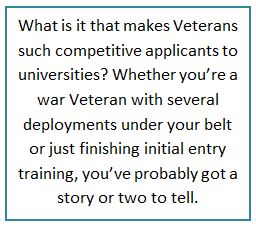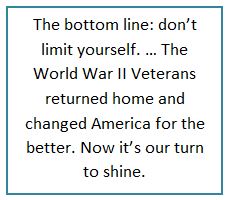
I was recently accepted to transfer to Stanford University, but like many of you I come from a humble background: I grew up without much money, barely passed high school, and joined the Army Reserve because I wanted something more out of life. It was the best decision of my life, because those years in the Reserve and a deployment to Afghanistan turned me into a well-rounded, mature individual. I was different, light years away from those high school days when I could barely pass the standard. My story isn’t all that unique; the military experience generally makes everyone wiser – which is why many universities are looking to add Veterans to their student population.
In his blog post “Student Veterans: Don’t Set Your Sights Too Low,” former VA blogger Alex Horton addresses Veterans selling themselves short when it comes to higher education. Veterans sometimes label themselves “not smart enough“ or point to their high school record as an indicator for college success and don’t take credit for how much they’ve grown since high school.
On its admissions page, Stanford identifies Veterans as having “unique” experiences and says the school is looking for unique qualities. In other words, Stanford wants Veterans to be part of their diverse student population. Stanford isn’t the only school that gives Veterans a competitive advantage. Five other universities, of many, that have special websites for Veterans are UCLA, UC Berkley, Columbia University, Amherst University and Ohio State University.

Just looking at 2010, considering that the number of Veterans who apply is probably much lower than 10 percent of all applicants, the odds increase dramatically for Veterans who are looking to transfer. This doesn’t mean being a Veteran automatically gets you admission, but it does get your foot in the door.
What is it that makes Veterans such competitive applicants to universities? Whether you’re a war Veteran with several deployments under your belt or just finishing initial entry training, you’ve probably got a story or two to tell. Maybe your story is about the time you discovered a hidden cache of explosive materials. Maybe your story is about how Skype saved your marriage during deployment. Regardless, you’ve got tales to tell that are far different than what most applicants offer. The fact that you’ve served is an achievement in itself that will stand out during the application process and your learned maturity is a big plus in the eyes of admissions staff.
Here are a few more reasons to apply to your dream university.
First, while top-notch universities are famous for their higher tuition rates, they also have more money to distribute for need-based financial aid. In my case, I’ll be paying much less at Stanford this year than my friends at local, public universities.

Third, the opportunities are better at these universities. One main reason I applied to Stanford was because of the ease with which undergraduates can conduct research. Many educational opportunities await at top-notch universities. Also, many selective institutions of higher learning purposefully seek to have a diverse student body. Within that setting, students from all over the world, who have their own unique history, will be studying with you, and you won’t feel so out of place.
And finally, networking. You never know; maybe you’ll meet a future president of the United States!
The bottom line: don’t limit yourself. Start your application process early and tap into your military connections for letters of recommendation. And if you get into your dream school, let other Veterans know about it and encourage them to do the same. The World War II Veterans returned home and changed America for the better. Now it’s our turn to shine.
Find information on your VA educational benefits here.
Topics in this story
More Stories
The Social Security Administration is hoping to make applying for Supplemental Security Income (SSI) a whole lot easier, announcing it will start offering online, streamlined applications for some applicants.
Yusuf Henriques, an Army Veteran and former combat medic, is the founder and CEO of IndyGeneUS AI, a genomics company on a mission to improve health equity by increasing representation of women and racial minorities in clinical trials.
Online shopping scams are the riskiest scam for Veterans, with 77.3% of reports confirmed losing money when targeted by this scam.







NOTE: this year the transfer admissions rate for Stanford was less than 2%… But roughly 20% of us transfers are veterans. Specifically, Stanford has made it a goal to look strongly at vets durin admissions for undergrad and grad school.
To Roger: Though I use my current college as an example, I think veterans should apply to where they *want* as opposed to where they feel they can get into. The exception being for-profit colleges, who are notorious for generally being pricey and useless.
If Utah has what a vet wants, then apply. Same goes with any college. I’ve just seen too many veterans shoot for the lowest goal, because they feel they aren’t “smart” enough for a 4-year. And with all due respect to them, that’s BS.
The University of Utah also holds Veterans in respect by (among other things) having a specific Veterans Center (http://veteranscenter.utah.edu/) on campus where Vets can find individual attention and help, not to mention other Vets who ‘get it’. The outstanding academic programs coupled with the amazing location creates a great place to build your future. Don’t overlook Utah! NOT what you think!
Dear Stanford,
I’m impressed with you school wanting to have veterans in their ranks. I think it’s imperative that this happens. These persons certainly do have their life’s experience to impart on generations to come. It is so necessary to place emphasis on philosophies such as this:
There are no great men just great challenges that ordinary men and women under extraordinary circumstances are able to meet. The difficult we do immediately. The impossible takes a little longer.
WR Walters
USMC, 1971 – 1975